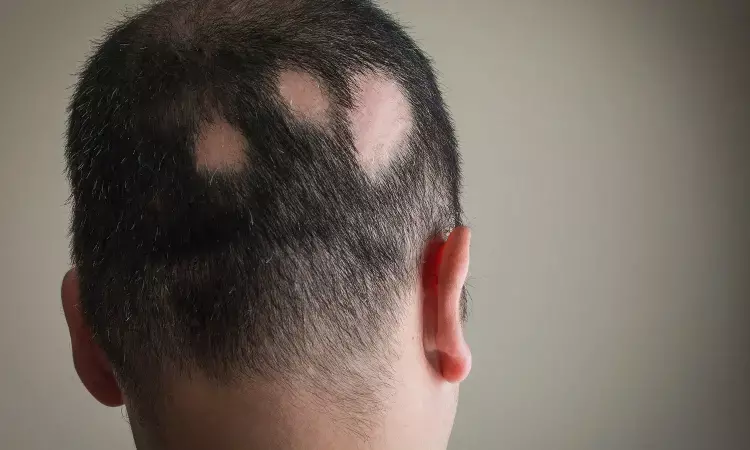- Home
- Medical news & Guidelines
- Anesthesiology
- Cardiology and CTVS
- Critical Care
- Dentistry
- Dermatology
- Diabetes and Endocrinology
- ENT
- Gastroenterology
- Medicine
- Nephrology
- Neurology
- Obstretics-Gynaecology
- Oncology
- Ophthalmology
- Orthopaedics
- Pediatrics-Neonatology
- Psychiatry
- Pulmonology
- Radiology
- Surgery
- Urology
- Laboratory Medicine
- Diet
- Nursing
- Paramedical
- Physiotherapy
- Health news
- Fact Check
- Bone Health Fact Check
- Brain Health Fact Check
- Cancer Related Fact Check
- Child Care Fact Check
- Dental and oral health fact check
- Diabetes and metabolic health fact check
- Diet and Nutrition Fact Check
- Eye and ENT Care Fact Check
- Fitness fact check
- Gut health fact check
- Heart health fact check
- Kidney health fact check
- Medical education fact check
- Men's health fact check
- Respiratory fact check
- Skin and hair care fact check
- Vaccine and Immunization fact check
- Women's health fact check
- AYUSH
- State News
- Andaman and Nicobar Islands
- Andhra Pradesh
- Arunachal Pradesh
- Assam
- Bihar
- Chandigarh
- Chattisgarh
- Dadra and Nagar Haveli
- Daman and Diu
- Delhi
- Goa
- Gujarat
- Haryana
- Himachal Pradesh
- Jammu & Kashmir
- Jharkhand
- Karnataka
- Kerala
- Ladakh
- Lakshadweep
- Madhya Pradesh
- Maharashtra
- Manipur
- Meghalaya
- Mizoram
- Nagaland
- Odisha
- Puducherry
- Punjab
- Rajasthan
- Sikkim
- Tamil Nadu
- Telangana
- Tripura
- Uttar Pradesh
- Uttrakhand
- West Bengal
- Medical Education
- Industry
Active ritlecitinib may improve hair growth in patients with alopecia areata: Study

A new study published in the journal of Dermatology suggests that the Alopecia areata patients who were receiving doses of active ritlecitinib reported better outcomes in terms of satisfaction with hair growth. Alopecia areata (AA) is an autoimmune illness that mostly affects the face, scalp, and/or body. One or more patches of hair loss, total scalp hair loss, or total loss of body, face, and scalp hair can all occur. In the USA, Japan, EU, China, and numerous other countries, ritlecitinib which is a selective dual inhibitor of JAK3 and all 5 TEC family kinases, is licensed for use in treating adult and adolescent patients with severe AA who are between the ages of 12 and 17. Thus, this study by Rodney Sinclair and colleagues measured the level of patient happiness with hair growth in patients with AA who were either given ritlecitinib or a placebo, as well as the relationship between patient satisfaction and clinician-assessed effectiveness.
The patients with AA with ≥50% scalp hair loss were randomized in the ALLEGRO-2b/3 study to receive daily ritlecitinib or placebo for 24 weeks, followed by a 24-week extension during which they may continue receiving ritlecitinib or shift from placebo to ritlecitinib. 3 categories like the quantity, quality, and overall satisfaction with hair growth were assessed using the Patient Satisfaction with Hair Growth (P-Sat) measure. A number of post hoc studies determined polyserial correlations between modifications from baseline (CFB) in Severity of Alopecia Tool (SALT) and P-Sat ratings at weeks 24 and 48, as well as the percentage of patients who were moderately/very happy and moderately/very dissatisfied.
By week 24, the percentage of patients who were satisfied with their hair growth overall varied between the ritlecitinib 10-mg and 200/50-mg groups (36.4%) and the placebo groups (22.6%). At week 48, the percentage of satisfied patients in the ritlecitinib-randomized group either rose or remained stable. When switching from a placebo to ritlecitinib, a significantly higher percentage of patients expressed satisfaction at week 48 when compared to week 24. The advantage of ritlecitinib was also observed in the post hoc analysis that defined satisfaction as moderately/very satisfied and unhappiness as moderately/very unhappy. At weeks 24 and 48, there was a substantial correlation between all P-Sat domain scores and CFB-SALT scores. Overall, Ritlecitinib should be explored in patients with 50% or more hair loss due to alopecia areata, since satisfaction levels remained stable 48 weeks following therapy commencement.
Source:
Sinclair, R., Law, E. H., Zhang, X., Zhang, F., Napatalung, L., Zwillich, S. H., King, B., & Mesinkovska, N. (2024). Patient-Reported Satisfaction with Hair Regrowth in a Study of Ritlecitinib in Alopecia Areata: Results from ALLEGRO-2b/3. In Dermatology (pp. 1–11). S. Karger AG. https://doi.org/10.1159/000539536
Neuroscience Masters graduate
Jacinthlyn Sylvia, a Neuroscience Master's graduate from Chennai has worked extensively in deciphering the neurobiology of cognition and motor control in aging. She also has spread-out exposure to Neurosurgery from her Bachelor’s. She is currently involved in active Neuro-Oncology research. She is an upcoming neuroscientist with a fiery passion for writing. Her news cover at Medical Dialogues feature recent discoveries and updates from the healthcare and biomedical research fields. She can be reached at editorial@medicaldialogues.in
Dr Kamal Kant Kohli-MBBS, DTCD- a chest specialist with more than 30 years of practice and a flair for writing clinical articles, Dr Kamal Kant Kohli joined Medical Dialogues as a Chief Editor of Medical News. Besides writing articles, as an editor, he proofreads and verifies all the medical content published on Medical Dialogues including those coming from journals, studies,medical conferences,guidelines etc. Email: drkohli@medicaldialogues.in. Contact no. 011-43720751


